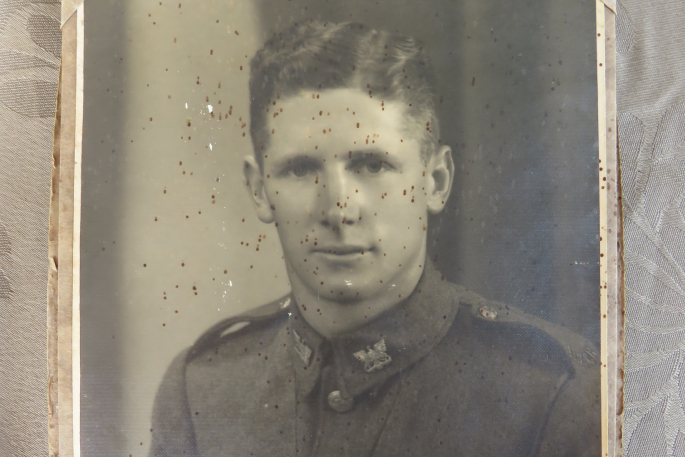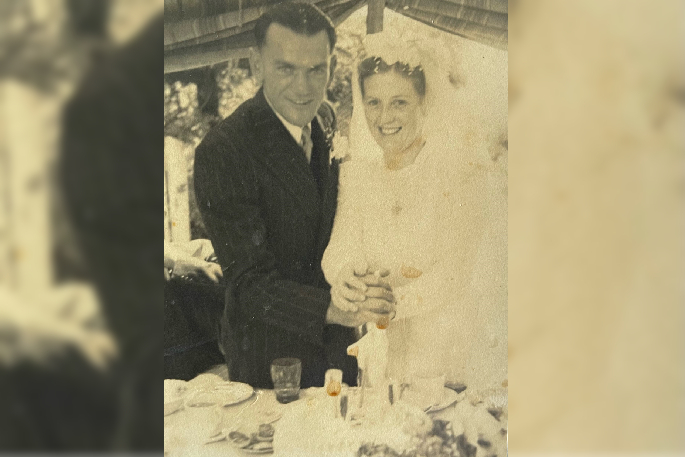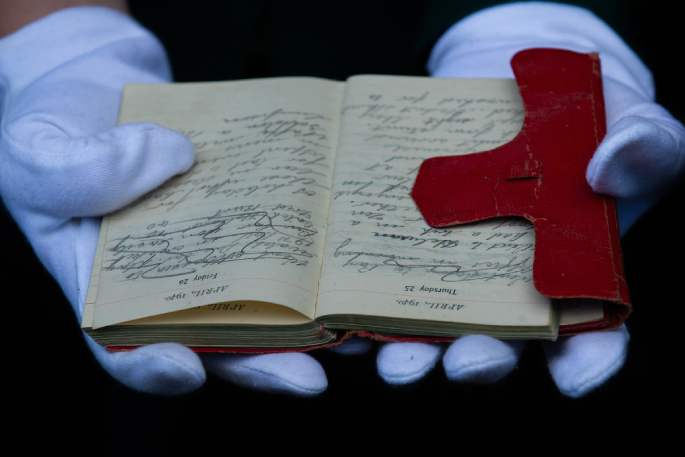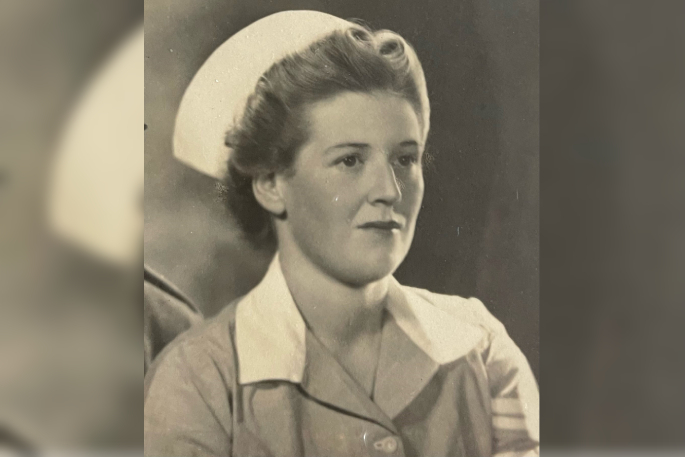“My feelings are all over the place! Poor Jessie.”
Pauline McCowan, the Western Bay Museum volunteer whose research set The Weekend Sun on the trail of ‘Jessie’ – the uninym, the enigma, the love interest, in the World War II battlefront diary of Katikati soldier Lieutenant Russell Freeland Walford.
The 29-year-old was killed in the Italian campaign in December 1943.
He left behind his 1940 diary with dozens of heartfelt references to the mysterious ‘Jessie’.
When The Weekend Sun published the story of the soldier’s little red leather diary, ‘Jessie’ was just a Christian name.
No-one knew who she was.
But the mystery has been solved.
We can give ‘Jessie’ a surname, a face and a backstory.
“Yes, my Aunt Jessie,” confirmed Russell Clague when The Weekend Sun made a guesswork call to Russell’s Whitianga phone number last week.
Aunt Jessie was Jessie Alice Clague.
As a “wee fella” Russell would holiday with Aunt Jessie in Blockhouse Bay, Auckland.
“She was really nice, loved her.”
And so, when Lieutenant Russell Walford fondly entered: “..wrote to Jessie between air raids” in his little red leather bound diary on Sunday May 12, 1940, he was referring to Jessie Alice Clague, formerly of Katikati, then nursing sister at Auckland Public Hospital.
 Jessie’s first love – Lieutenant Russell Walford, killed 1943 in the Italian campaign. Photo: supplied.
Jessie’s first love – Lieutenant Russell Walford, killed 1943 in the Italian campaign. Photo: supplied.
A lead
A curious reader, unrelated to The Weekend Sun’s ‘Who’s Jessie?’ story last edition, provided a lead when he uncovered a 1941 newspaper notice.
“The engagement is announced between Sergeant Russell F.Walford ….and Jessie Alice, only daughter of Mr and Mrs J.T.Clague, Katikati.”
It’s understood Walford returned home during the war to train soldiers to drive tanks.
Perhaps that’s when he proposed?
Even then, the couple was cheated of a date at the altar.
Walford was killed in 1943 during the Italian campaign.
“Bloody war!” says Pauline, who transcribed 365 days of entries in the little red diary that now sit safely in the Western Bay Museum.
A wedding
But out of loss and grief came love and marriage.
It was 1948.
“A wedding took place recently at St Peters Church, Katikati, when Jessie Alice, only daughter of Mr and Mrs J.T.Clague was married to John, younger son of Mrs G.Gardner of Auckland.”
 Jessie finds happiness – marrying John Gardner in Katikati in 1948. Photo: supplied.
Jessie finds happiness – marrying John Gardner in Katikati in 1948. Photo: supplied.
It was a ’”very pretty” wedding.
“The bride wore a low waisted gown of white faconne with a high neckline and fitting bodice.”
“Well, I hope it was a long and happy marriage,” says Pauline. It was hope fulfilled.
Jessie and John were married for 54 years and had five children, the only daughter being Debbie who lives in Auckland.
“She was wonderful – always there for us.”
So the great nurse was a great Mum.
“She had a wonderful sense of knowing when you were sick and how to look after you without being in your face.”
Debbie lost her Mum in 2009, just short of her ninetieth birthday.
“Even now when I am sick, I think: ‘Where are you Mum?’” The nurse is gone, but she’s still called upon 15 years later.
Another nearly lost
And WWII, which had claimed one love of Jessie’s just about claimed another.
Because John Gardner, service number 33411, of the Second Expeditionary Force, became Prisoner of War serial number 7525 after his capture in Greece.
He spent the war in Stalag XVIII-A – a WW II German Army ‘Wehrmacht’ POW camp – in Austria.
Gardner survived bullets and bombs, the ravages of a POW camp and typhus, but came home with tuberculosis – “white death”.
It hospitalised him for a year and nephew Russell remembers the soldier being “pretty crook”.
They “flattened” a lung – artificial pneumothorax, the first positive treatment for TB.
That, and light, and love, and hope worked for the soldier.
Because one evening in 1947 Jessie Clague stepped out from the Auckland Hospital nurses’ home on a blind date.
Waiting for her was John Gardner in a rather sharp jacket.
Everything clicked for soldier and nurse.
They would marry, raise a family and grow hot house tomatoes in Blockhouse Bay.
“Mum wasn’t academic but very practical,” says Debbie.” And she was a bit more serious. Dad, or John, on the other hand, was a bit of a hard case.
“Reasonably good-looking, dark hair…and a big nose.” Debbie chuckles.
And he played the mouth organ.
The all-round Dad who adored his ‘Jessie’.
“Yes, a good man, a good father and a good husband.”
And despite the war, and TB, he would live to 86.
 The soldier’s little red diary – full of heart felt references to ‘Jessie’. Photo: John Borren.
The soldier’s little red diary – full of heart felt references to ‘Jessie’. Photo: John Borren.
A beautiful outcome
Jessie would talk of Russell Walford.
“Not often, and not much, but he wasn’t a secret. She told us they were engaged,” recalls Debbie.
And when told that museum researcher Pauline McCowan held Walford up as a “really decent bloke” after reading his diary, Debbie could “absolutely” believe it.
“I can’t imagine Mum being engaged to someone who wasn’t.”
And after losing one good man, she’d been blessed with another.
“That is a beautiful outcome,” says Pauline.
Now Debbie wants to read the little red diary – to learn more of the man who loved her Mum.
Pauline will make that happen.

